The Microsoft 70-243 Practice Exam is a very hard exam to successfully pass your exam.Here you will find Free Braindump2go Microsoft Practice Sample Exam Test Questions that will help you prepare in passing the 70-243 exam.Braindump2go Guarantees you 100% PASS exam 70-243
Vendor: Microsoft
Exam Code: 70-243
Exam Name: Administering and Deploying System Center 2012 Configuration Manager
QUESTION 31
Note: This question is part of a series of questions that use the same set of answer choices.
An answer choice may be correct for more than one question in the series.
Your network contains a System Center 2012 Configuration Manager environment.
Your company develops a custom hardware device and installs the device on all of the client computers in the research department.
You discover that information about the device fails to appear in any inventory queries or reports. Information about other hardware devices appears in the inventory queries and reports.
You need to ensure that Configuration Manager data includes information about the custom hardware device.
What should you do?
A. Enable a default WMI class in the Hardware Inventory Classes list.
B. Modify the Enable hardware inventory on clients setting.
C. Add a WMI class to the Hardware inventory Classes list.
D. Add a file name to the Software Inventory configuration.
E. Select Collect NOIDMIF files in Hardware Inventory.
F. Add a file name to the Hardware inventory configuration.
G. Add a file name to Software Metering.
H. Add a WMI class to the Sms_def.mof file.
I. Modify the Enable software inventory on clients setting.
Answer: C
Explanation:
Adding new device/class to hardware inventory
In the hardware inventory class window click the add button
Next click the ‘Connect’ button
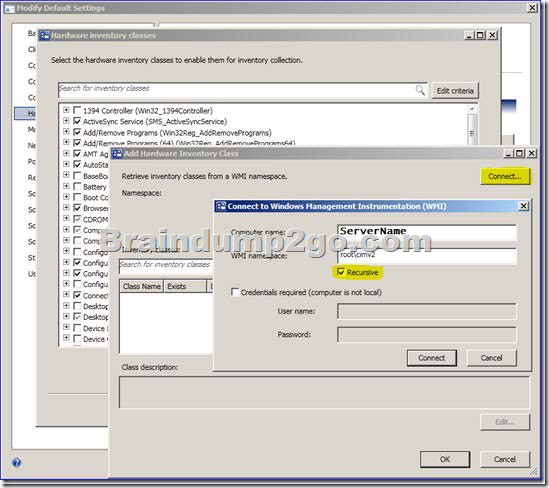
Select the desired class and click ‘Edit’
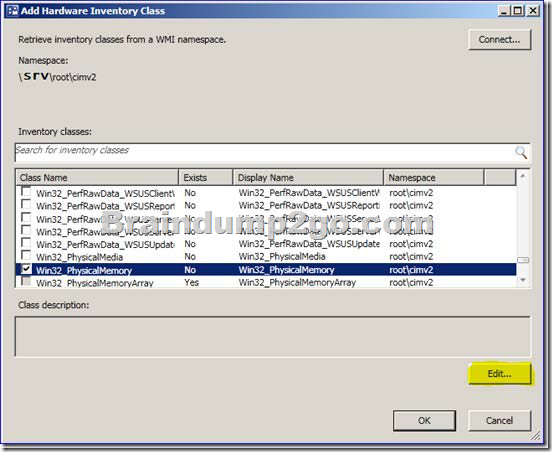
Give your new device/class a friendly name (instead of the default class name)
You can also set the unit size
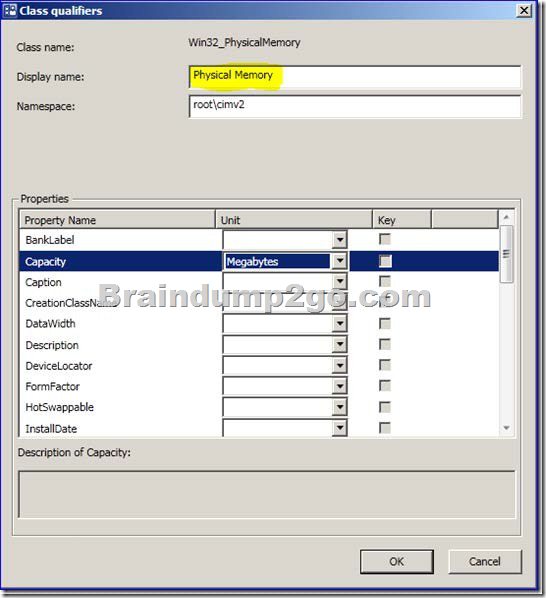
Now you can select the properties you want to add (as you did in the previous section).
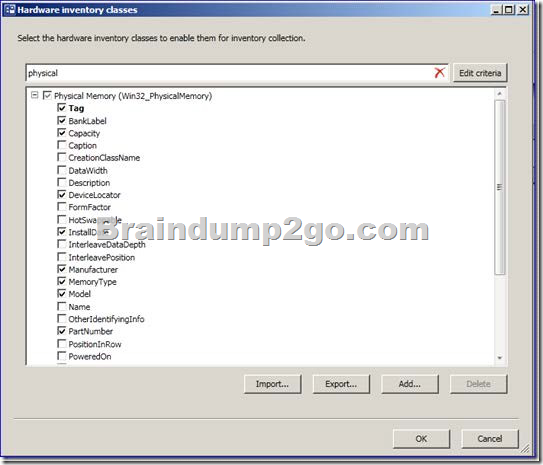
You can see the result in the resource explorer:
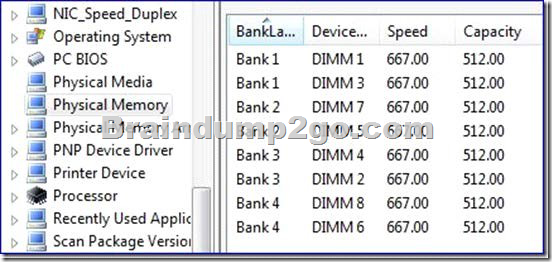
Hardware inventory works by querying Windows Management Instrumentation (WMI) for all data from certain WMI classes. WMI includes classes for operating system configuration and entities (such as user accounts), installed software, software configuration, and other objects (such as for the logged on user). These classes are supplements to hardware classes. Hardware inventory collects information about many things besides hardware. For example, it can inventory software by collecting details about programs listed in Add or Remove Programs in Control Panel or programs that have been installed using Windows Installer.
most of your inventory needs can be served by hardware inventory collection alone.
QUESTION 32
Note: This question is part of a series of questions that use the same set of answer choices.
An answer choice may be correct for more than one question in the series.
Your network contains a System Center 2012 Configuration Manager environment.
Your company deploys a custom Application to 2,000 client computers by using Configuration Manager. The Application is not listed in Add Remove Programs.
You discover that information about the Application fails to appear in the inventory queries and inventory reports.
You verify that information about other Applications appear in the inventory reports.
You need to ensure that Configuration Manager data includes installation information about the custom Application.
What should you do?
A. Add a file name to Software Metering.
B. Add a WMI class to the Hardware Inventory Classes fat
C. Add a file name to the Hardware Inventory configuration.
D. Enable a default WMI Cass in the Hardware Inventory Classes list.
E. Select Collect NOIDMIF files .n Hardware Inventory.
F. Add a file name to the Software Inventory configuration.
G. Modify the Enable hardware inventory on Cents setting.
H. Add a WMI class to the Sms_def.mof file.
Answer: F
Explanation:
Inventory of Custom application sw, the sw is not in add remove program Add a File name to the SW Inventory configuration
Reg key for Add/remove program is :
HKEY_LOCAL_MACHINE\Software\Microsoft\Windows\CurrentVersion\Uninstall If custom sw is not in Add/remove list then, wmi still has the custome app info by query another reg key: HKEY_CLASSES_ROOT\Installer\Products but safer to use sw inventory (#file inventory) Software inventory works by scanning the disks on each computer to find files and gather information about files. You can also configure software inventory to collect specific files when it finds them. Software Inventory=File Inventory.
In the Configuration Manager console, Administration, Client Settings.
Default Client Settings.Properties , Default Settings ,Software Inventory.
In the Device Settings list, configure the following values:
Enable software inventory on clients
From the drop-down list, select True.
Schedule software inventory and file collection schedule ….
Configure the client settings that you require: Path , file name xxx.exe… http://technet.microsoft.com/en-us/library/cc180952.aspx#EBAA
QUESTION 33
Note: This question is part of a series of questions that use the same set of answer choices.
An answer choice may be correct for more than one question in the series.
Your network contains a System Center 2012 Configuration Manager environment.
Your company deploys a third-party Application to 10,000 client computers.
You need to ensure that you can run a report that lists all of the client computers that ran the Application last month.
What should you do?
A. Modify the Enable hardware inventory on clients setting.
B. Enable a default WMI class in the Hardware Inventory Classes list.
C. Modify the Enable software inventory on clients setting.
D. Add a file name to the Hardware Inventory configuration.
E. Add a WMI class to the Hardware Inventory Classes list.
F. Add a file name to the Software Inventory configuration.
G. Add a file name to Software Metering.
H. Add a WMI class to the Sms_def.mof file.
I. Select Collect NOIDMIF files in Hardware Inventory.
Answer: G
Explanation:
http://technet.microsoft.com/en-us/library/gg682005.aspx
Introduction to Software Metering in Configuration Manager
Use software metering in System Center 2012 Configuration Manager to monitor and collect software usage data from Configuration Manager clients.
To collect this usage data, configure software metering rules or use the Configuration Manager inventory to generate these rules automatically. Client computers evaluate these rules and collect metering data to send to the site.
QUESTION 34
Your network contains a System Center 2012 Configuration Manager environment.
You need to create a report that lists all of the client computers that do not have an Application named App1 instated.
Which query should you use to create the report?
A. SELECT SYS.Netbios_Name0, ARP.DisplayName0
FROM v_R_System AS SYS INNER JOIN
v_GS_ADD_REMOVE_PROGRAMS AS ARP ON SYS.ResourceID = ARP.
ResourceID WHERE ARP.DisplayName0 NOT IN (‘App1’)
B. SELECT SYS.Netbios_Name0 from v_R_System SYS
WHERE SYS.ResourceID IN
(SELECT SYS.ResourceID
FROM v_R_System AS SYS INNER JOIN
v_GS_ADD_REMOVE_PROGRAMS AS ARP ON SYS.ResourceID – ARP.
ResourceID. WHERE ARP.
DisplayName0 = ‘App1’)
C. SELECT SYS.Netbios_Name0 from v_R_System SYS
WHERE SYS.ResourceID NOT IN
(SELECT SYS.ResourceID
FROM v_R_System AS SYS INNER JOIN
v_GS_ADD_REMOVE_PROGRAMS AS ARP ON SYS.ResourceID = ARP.
ResourceID WHERE ARP.
DisplayName0 = ‘App1’)
D. SELECT SYS.Netbios_Name0, ARP.DisplayName0
FROM v_R_System AS SYS INNER JOIN
V_GS_ADD_REMOVE_PROGRAMS AS ARP ON SYS.ResourceID – ARP.
ResourceID WHERE ARP.
DisplayName0 NOT LIKE ‘App1’
Answer: C
Explanation:
SELECT computer name FROM table v_R_System (SQL Syntax)
WHERE resource ResourceID is NOT IN
Add Remove Programs WHERE DisplayName0 = ‘App1’
http://www.w3schools.com/sql/sql_join_inner.asp
SQL INNER JOIN Keyword
The INNER JOIN keyword returns rows when there is at least one match in both tables.
QUESTION 35
Network contains a System Center 2012 Configuration Manager environment.
You have the following query:
Select
R.Name,
U.UserName
from
SMS_R_System R
join SMS_R_User U
on R.LastLogonUserName = U.UserName
You need to ensure that all of the client computers are listed in the query results.
Which join type should you use?
A. LEFT
B. FULL
C. INNER
D. RIGHT
Answer: A
Explanation:
http://www.w3schools.com/sql/sql_join_left.asp
SQL LEFT JOIN Keyword
The LEFT JOIN keyword returns all rows from the left table (table_name1), even if there are no matches in the right table (table_name2).
Further information:
http://www.w3schools.com/sql/sql_join_full.asp
SQL FULL JOIN Keyword
The FULL JOIN keyword return rows when there is a match in one of the tables.
http://www.w3schools.com/sql/sql_join_inner.asp
SQL INNER JOIN Keyword
The INNER JOIN keyword returns rows when there is at least one match in both tables.
http://www.w3schools.com/sql/sql_join_right.asp
SQL RIGHT JOIN Keyword
The RIGHT JOIN keyword returns all the rows from the right table (table_name2), even if there are no matches in the left table (table_name1).
QUESTION 36
You have a System Center 2012 Configuration Manager environment.
You use Active Directory System Discovery to discover computers that are located in the Sales organizational unit (OU) and in all child OUs under the Sales OU. Discovering computers in all the child OUs is requiring a significant amount of time to complete.
You need to configure discovery for only computers in the Sales OU.
What should you do?
A. Clear the Recursive check box for the Sales OU discovery.
B. Clear the Include Groups check box for the Sales OU discovery.
C. Create a custom LDAP query to LDAP://OU=Sales,DC=SCCMDEMO,DC=COM.
Select the Recursive check box.
D. Select the option to browse to the Sales OU, and then select the Sales OU.
Select the Recursive check box.
Answer: A
QUESTION 37
You have a System Center 2012 Configuration Manager environment.
You need to install the Configuration Manager client software by using a logon script.
What should you configure the logon script to run?
A. CCMSetup.exe
B. CCMSetup.msi
C. Capinst.exe
D. Client.msi
Answer: A
QUESTION 38
You have a System Center 2012 Configuration Manager environment running in native mode. You have a perimeter network for your Internet-based site systems.
You block the SMB traffic from the perimeter network to your intranet.
You configure the site systemsproperties to allow only site server initiated data transfers from the site systems.
You need to configure site system communications between the perimeter network and the site server.
What should you do?
A. Configure the fallback status points.
B. Configure a server locator point.
C. Configure a Client Connection account.
D. Configure a Site System Installation account.
Answer: D
QUESTION 39
You have a System Center 2012 Configuration Manager environment.
You deploy Microsoft Office 2007 to client computers in a collection named Coll1.
You run the Configuration Manager Web report for Add or Remove Programs, and you query for Office 2007. No computers are found to have Office 2007 installed.
You need to identify computers that have Office 2007 installed. What should you do?
A. Configure software inventory to run daily.
B. Configure hardware inventory to run daily.
C. Configure Coll1 to update membership daily.
D. Configure Coll1 to have a collection-specific polling interval.
Answer: B
QUESTION 40
You have a System Center 2012 Configuration Manager environment.
You want to create a new package for an application. In the Configuration Manager console, you right-click the Packages node.
You do not see the option to create a new package.
You need to be able to create packages. What should you do?
A. Request Package Class Create rights for your user account.
B. Request Package Instance Create rights for your user account.
C. Request Package Instance Class Modify rights for your user account.
D. Request that your user account be added to the SMS Admins local group on the site server.
Answer: A
Want to be 70-243 certified? Using Braindump2go New Released 70-243 Exam Dumps Now! We Promise you a 100% Success Passing Exam 70-243 Or We will return your money back instantly!

